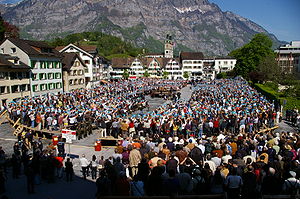
| This article is part of a series on the |
 |
|---|
|
|
The Landsgemeinde ("cantonal assembly"; German: [ˈlantsɡəˌmaɪndə], plural Landsgemeinden) is a public, non-secret ballot voting system operating by majority rule. Still in use – in a few places – at the subnational political level in Switzerland, it was formerly practiced in eight cantons. For practical reasons [citation needed], the Landsgemeinde has been abolished at the cantonal level in all but two cantons where it still holds the highest political authority: Appenzell Innerrhoden and Glarus. The Landsgemeinde is also convened in some districts of Appenzell Innerrhoden, Grisons and Schwyz to vote on local questions.
The German term Landsgemeinde itself is attested from at least the 16th century, in the 1561 dictionary of Pictorius. It is a compound from Land "land, canton; rural canton" and Gemeinde "community, commune".
Eligible citizens of the canton or district meet on a certain day in the open air to decide on specific issues. Voting is accomplished by raising one's hand in favor of a motion. Historically, the only proof of citizenship necessary for men to enter the voting area was to show their ceremonial sword or Swiss military sidearm (bayonet); this gave proof that they were a freeman allowed to bear arms and to vote. While voting cards have been introduced, in Appenzell presenting a sidearm is still a valid alternative to the voting card for men.
The Landsgemeinde has been the sovereign institution of the Swiss rural cantons since the late Middle Ages, while in the city-cantons such as Lucerne, Schaffhausen, or Bern, a general assembly of all citizens was never established.
Similar assemblies in dependent territories were known under terms such as Talgemeinde (for Talschaften, used in Ursern, Hasli, Obersimmental), Teding (Engelberg), Parlamento (Leventina), and Zendgemeinden (for the Zenden or districts of Valais), but also as Landsgemeinde in Toggenburg and in parts of Grisons.[1]
- ^ Stadler, Hans: Landsgemeinde in German, French and Italian in the online Historical Dictionary of Switzerland, 18 January 2021.